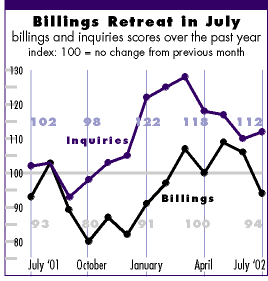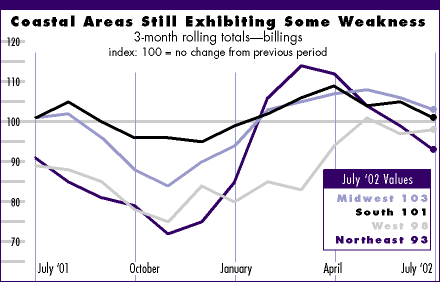
Key September 11 legacy for design professions will be changing metro development patterns

Work-on-the-Boards Survey
by Kermit Baker, PhD, Hon. AIA
AIA Chief Economist
Just when we felt comfortable knowing that stronger economic times for the construction industry were well established, architecture firms hit a bump in the road in July. After four straight months of solid billings numbers, firms reported a dip last month, with a quarter of firms reporting a noticeable decrease in billings while only 19% reported a noticeable increase. Inquiries for new work continued to improve modestly, holding out hope that the July numbers are a bump rather than the beginning of a downward trend.
 Regionally,
firms in the Northeast have felt the squeeze hardest. After reporting
the strongest growth figures this past spring, firms in this region are
now seeing the weakest conditions nationally. Firms in the West also have
seen growth trends stall in recent months.
Regionally,
firms in the Northeast have felt the squeeze hardest. After reporting
the strongest growth figures this past spring, firms in this region are
now seeing the weakest conditions nationally. Firms in the West also have
seen growth trends stall in recent months.
The trends reported by architecture firms are mirrored in the larger economy. After signs of a surprisingly strong recovery earlier this year, economic growth has been anemic over the past month or two. Job growth, an important indicator of our economy's health, has been very modest. Only 6,000 jobs were added nationally in July, bringing the three-month total to a mere 94,000 jobs. In the previous 13 months (dating back to April 2001) almost 1.8 millions jobs were lost in our economy, so we have not even seriously begun to build back to pre-recession levels. The national unemployment rate held steady at 5.9% in July.

Growth in our overall economy shot up at a 5.0% rate in the first quarter this year, but recent numbers indicate that growth slowed to a mere 1.1% rate in the second quarter. The third quarter doesn't seem to be getting off to any better start: the University of Michigan's consumer sentiment index declined in July, and the Institute of Supply Management's reading for the industrial economy also took a significant turn downward in July. Indicators of future economic growth also softened in July. And while the Federal Reserve Board decided against lowering short-term interest rates at their mid-August meeting, they indicated that the next move is likely to be down.
The effects of September
11
As we approach the anniversary of the September 11 terrorist attacks,
we now have more perspective on evaluating their longer-term impact. We
asked our Work-on-the-Boards firms to evaluate how things have changed
over the past 11 months. More than 4 in 10 firms strongly agree with the
statement that there is greater emphasis on security in the design and
redesign of public buildings. However, only one in 25 firms strongly agrees
that there is the same attention to security now in private buildings.

Over the longer term, 21% of firms strongly agree that building security concerns will significantly affect the design professions in the coming decade (64% of firms somewhat agree with that statement). Smaller firms (under $1 million in annual billings) were more likely to agree with this statement, with 27% strongly agreeing versus 16% of firms with billings over $1 million.
Also, fully a quarter of firms strongly agree that building security concerns will significantly affect metropolitan development patterns over the coming decade, while an additional 48% somewhat agree. Firms in the Northeast were more likely to strongly agree with this statement. Firms in the West were least likely to agree with it.
Copyright 2002 The American Institute of Architects. All rights reserved.
![]()
|
|
|